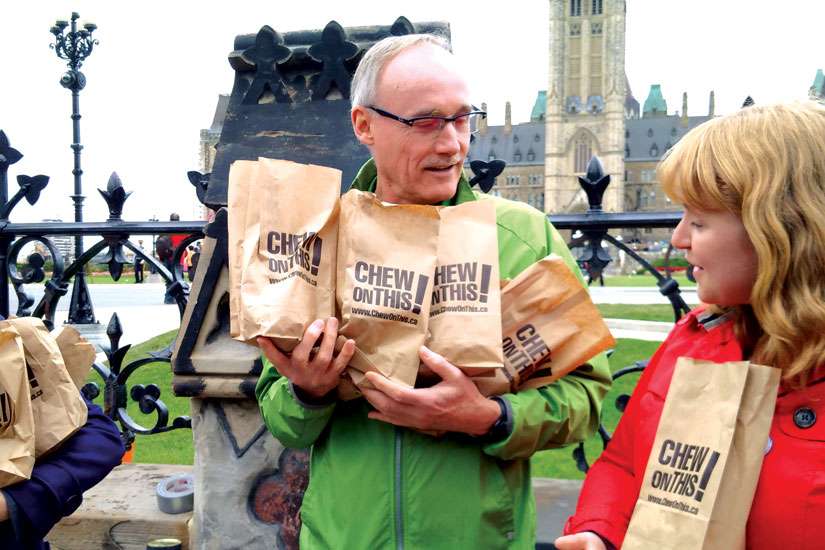The controversial audits, initiated in 2012, are being phased out under the Liberal government, according to a Jan. 20 statement from Revenue Minister Diane Lebouthillier. She said past audits showed “substantial compliance” with rules which restrict political activity by charities.
Twenty-four audits currently under way, including audits of Development and Peace and the Canadian Council of Churches (CCC), will be completed as the program winds down.
“We’re glad government resources might be more directed to development programs than on political checkups on NGOs,” said Development and Peace In-Canada Programs deputy director Ryan Worms.
Development and Peace underwent a CRA audit in 2013, Worms said, and “we are still waiting for the results.”
“We are already under review and we will still be under review but we are confident we’ll not have issues raised with the audit,” he said. “We operate under strict guidelines regarding the followup of our projects, transparency of our finances and on limiting political activity.”
Registered charities are permitted to allocate a maximum of 10 per cent of their resources to what the CRA classifies as non-partisan political activities. Charities are not permitted to engage in partisan activities such as endorsing or criticizing specific politicians or their party’s policies.
The Catholic Register was registered as a charity in 2012 but has never faced an audit.
Initially, the auditing program focused on environmental organizations but later targeted some poverty groups and NGOs. Like Development and Peace, the Canadian Council of Churches, which represents Catholic, Orthodox, mainline Protestant and evangelical denominations, is currently in the midst of a CRA audit. Several other charitable organizations have been audited, including Citizens for Public Justice, Project Ploughshares and the United Church of Canada.
“They don’t tell you why they chose you,” said Joe Gunn, executive director of Citizens for Public Justice.
“I don’t disagree there is a role for CRA to look at charities to make sure they are in the law,” said Gunn. “The problem is we have had an overly strict and a bit partial interpretation of this law to date.”
He said a CRA audit is not only time-consuming but also “it really creates a chill.” It has not been uncommon for some audits to drag on for several years.
“With a finite amount of government money available, to redirect the money that was spent on audits to other things might be more helpful for the country,” said CCC General Secretary Rev. Karen Hamilton.
Even with the change, the rules regarding political action are open to interpretation. Hamilton said her organization sent a document that outlined their interpretation of the CRA guidelines to see if it complied with the regulations.
The CCC has 25-member denominations and is “the most inclusive church council in the world, and operates by consensus,” Hamilton said. Therefore it is “more likely to have strong statements about poverty and about the theological rationale of all us working together to combat poverty than we are about a very specific piece of legislation.”
The CCC has been “recording zero for political activities,” she said. “When you read the definition very carefully, what it puts into the political category are comments and actions on particular legislation or lobbying a particular party.”
Hamilton said CCC comments on issues such as refugees or human trafficking are addressed to all political parties, and speak “more to principles” than any particular legislation.
Gunn said churches and charities should not be limited only to ministering to the poor through feeding or shelter programs. Their “experience on a range of issues” should enable them to “interact helpfully with policy makers to suggest solutions.”
“That should be recognized as valuable for a democratic society.”
Offering solutions means engaging on a political issue, communicating with a minister, writing briefs, he said.
“Most people recognize this as a good thing,” he said. “There’s a difference between that and partisan political activity.”
Leilani Farha, executive director of Canada Without Poverty, said ending the political audit program is “an important first step.”
“Reforming this legislation should be a priority, otherwise people living in poverty risk being silenced at the whim of government,” Farha said in a news release. “By limiting political activity in the ITA (Income Tax Act), the government creates conditions where charities are afraid to encourage systemic change.”
The CRA will continue its normal process of auditing 800 to 900 charities per year. Of 86,000 charities in Canada, CRA says about 500 report political activity.

